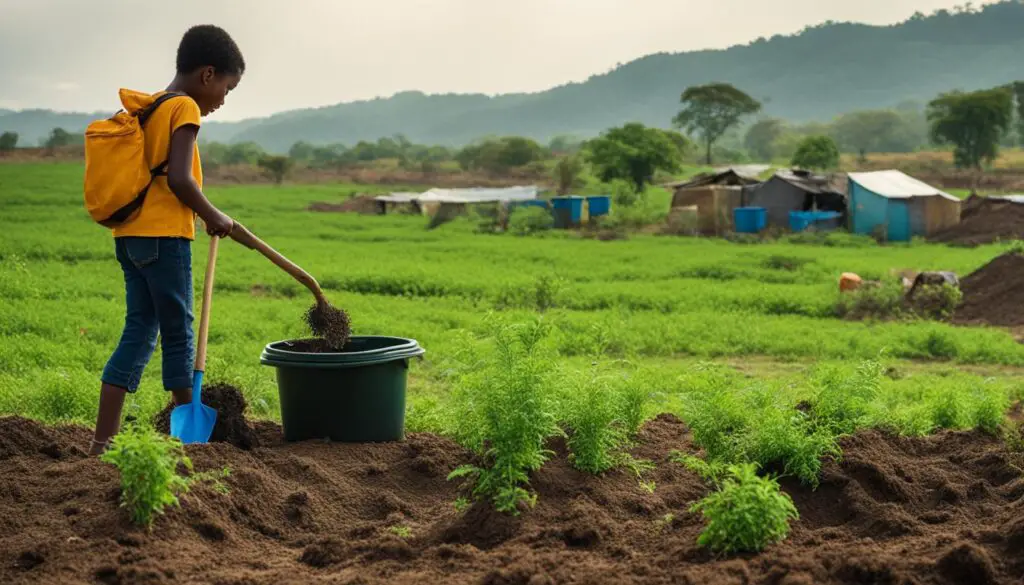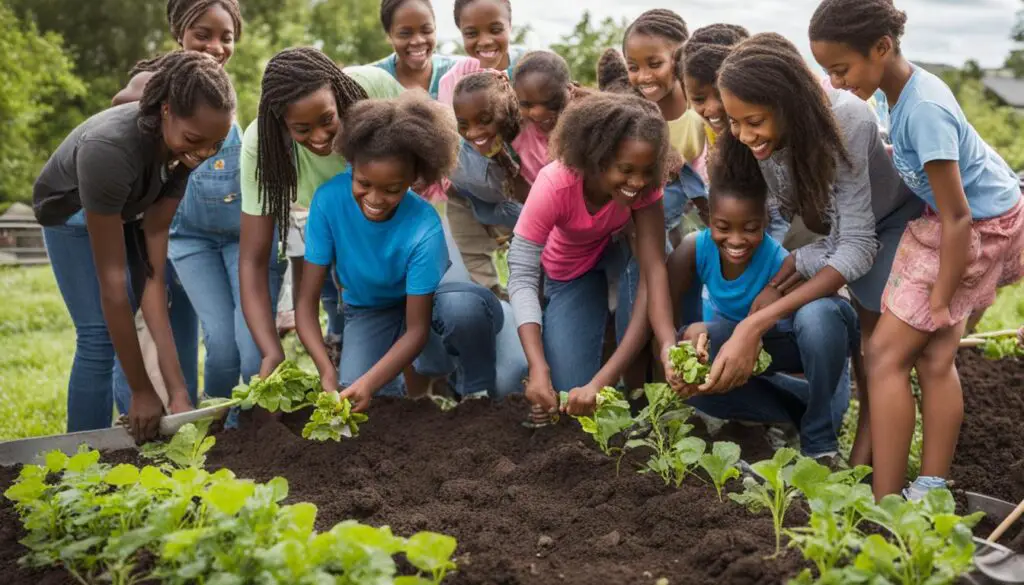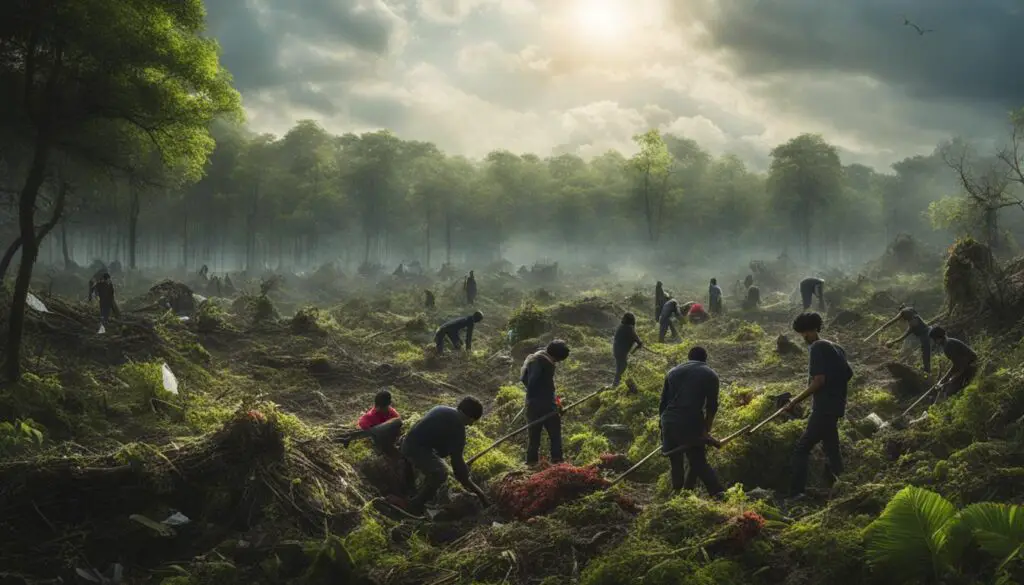As the younger generation seeks purpose and meaning in their lives, it is crucial for churches to address the topic of stewardship in a way that resonates with them. By understanding the importance of stewardship and its relevance to their lives, young people can embrace principles that shape their actions and guide their journey as responsible stewards. This article will explore various aspects of Bible stewardship, from caring for the Earth to community engagement, and provide insights on how churches can effectively communicate this message to the younger generation.
Key Takeaways:
- Young people have a significant role to play in stewardship, and it is essential to empower them to take action and contribute to responsible management.
- Caring for the Earth is a fundamental aspect of stewardship, and young people can embrace sustainable practices to contribute to the preservation of our planet.
- The biblical foundation of stewardship can be found in Genesis 1:28, where God grants humanity dominion over the Earth, with the responsibility to care for and preserve His creation.
- Sustainability and resource management are crucial in stewardship, and young people can adopt sustainable strategies and promote responsible resource management.
- Respecting all forms of life and valuing biodiversity are integral to stewardship, as young people actively contribute to the preservation of our planet’s diverse ecosystems.
What Can Youth Do
Young people have a significant role to play in stewardship, and there are numerous ways they can make a positive impact. By cultivating responsible management skills, engaging with their communities, practicing ethical behavior, and embracing their social responsibility, the youth can contribute to a more sustainable and just society.
Cultivating Responsible Management Skills: Youth can learn the importance of responsible management in various aspects of their lives. Whether it’s managing their personal finances, making environmentally conscious choices, or planning for the future, developing responsible management skills equips them to make informed decisions that benefit themselves and the world around them.
Engaging with Their Communities: Community involvement is vital for youth stewardship. By actively participating in community initiatives, volunteering, and supporting local organizations, young people can foster positive change, address pressing issues, and contribute to the well-being of their communities.
Practicing Ethical Behavior and Embracing Social Responsibility: Ethical behavior is an essential aspect of stewardship. Youth can prioritize honesty, integrity, and respect in their interactions with others and make choices that promote the common good. By embracing their social responsibility, young people can advocate for justice and equality, stand up for the marginalized, and work towards creating a more inclusive society.

Table: Examples of Youth Stewardship Actions
| Area of Stewardship | Youth Action |
|---|---|
| Environmental Stewardship | Participating in local clean-up drives, promoting recycling and waste reduction, advocating for sustainable practices |
| Social Justice | Organizing fundraisers for charitable causes, volunteering at local shelters or food banks, advocating for equal rights and opportunities |
| Community Engagement | Joining youth groups or clubs focused on community service, organizing community events or workshops, initiating neighborhood improvement projects |
| Education | Tutoring or mentoring younger students, promoting literacy programs, advocating for quality education for all |
In conclusion, youth stewardship encompasses responsible management, community involvement, ethical behavior, and social responsibility. Young people have the power to create meaningful change by embracing these principles and taking action. By empowering the youth to become active stewards, we can shape a better future for the next generation and foster a more sustainable and just society.
Caring for the Earth
As stewards of God’s creation, young people have a significant role to play in caring for the Earth and preserving its resources. By embracing sustainable living practices, understanding environmental ethics, and championing conservation and preservation efforts, they can make a positive impact on the planet and contribute to its long-term well-being.
Creation care is at the core of stewardship, emphasizing the importance of nurturing and protecting the natural world. This involves adopting sustainable practices in daily life, such as reducing waste, conserving energy, and choosing eco-friendly alternatives. By practicing sustainable living, young people can minimize their ecological footprint and contribute to the overall health and balance of the Earth.
“The earth is the Lord’s, and everything in it, the world, and all who live in it.” – Psalm 24:1
Environmental ethics also play a crucial role in guiding stewardship actions. Understanding the interconnectedness of all living beings and recognizing the inherent value of nature can inspire young people to prioritize conservation and preservation. By embracing a reverence for all life and striving to protect biodiversity and ecosystems, they can actively contribute to the flourishing of the Earth’s diverse ecosystems.
| Caring for the Earth | Sustainable Living | Environmental Ethics | Conservation and Preservation |
|---|---|---|---|
| Adopting sustainable practices | Reducing waste and conserving energy | Understanding interconnectedness of all living beings | Protecting biodiversity and ecosystems |
| Promoting eco-friendly alternatives | Minimizing ecological footprint | Recognizing inherent value of nature | Contributing to the flourishing of diverse ecosystems |
| Supporting conservation initiatives | Choosing renewable resources | Advocating for responsible resource management | Preserving natural resources for future generations |
By fostering a deep connection to the Earth and taking tangible actions to care for it, young people can become stewards of God’s creation, ensuring a sustainable and thriving planet for generations to come.
Genesis 1:28 – God’s Stewardship
In the book of Genesis, God grants humanity dominion over the Earth in Genesis 1:28, but this dominion comes with a responsibility to care for and preserve God’s creation. This verse serves as the foundation for understanding the concept of stewardship and the role that young people play in responsibly managing the resources entrusted to them.
As stewards of God’s creation, young people are called to embrace their role as caretakers of the Earth. This means recognizing that the Earth and all its inhabitants are gifts from God, and it is our duty to protect and preserve them for future generations.
God’s stewardship extends beyond just the physical environment; it also includes the social and spiritual aspects of life. Young people can use their influence and resources to bring about positive change in their communities, promoting justice, compassion, and equality.
The Importance of Dominion and Responsibility
The concept of dominion in Genesis 1:28 has often been misunderstood as an excuse for exploitation and abuse of the Earth. However, when coupled with the responsibility to care for and preserve God’s creation, it becomes clear that dominion implies a duty to act as responsible stewards.
| Key Points | Implications |
|---|---|
| God’s Ownership | Recognizing that the Earth belongs to God and we are entrusted with its care. |
| Accountability | Understanding that we will be held responsible for how we manage and use the resources we have been given. |
| Wisdom and Discernment | Seeking God’s guidance and making informed decisions that prioritize the well-being of creation. |
| Humility | Recognizing that our role as stewards is a humble one, requiring us to put the needs of creation above our own desires. |
“The Earth is the Lord’s, and everything in it, the world, and all who live in it.” – Psalm 24:1
By embracing the principles of stewardship in Genesis 1:28, young people can make a significant impact on the world around them. This includes caring for the environment, advocating for justice and equality, and living in harmony with all forms of life. Through their actions, young people can demonstrate their love for God and their commitment to being faithful stewards of His creation.
Sustainability and Resource Management
Becoming a steward of God’s creation involves practicing sustainable and responsible resource management. By adopting sustainable practices, young people can contribute to the preservation of our planet and ensure a better future for generations to come.
One key aspect of sustainability is the efficient use of resources. By minimizing waste and maximizing efficiency, we can reduce our ecological footprint and conserve valuable resources. This includes practices such as recycling, reducing energy consumption, and using renewable energy sources.
Table: Sustainable Practices
| Sustainable Practices | Benefits |
|---|---|
| Recycling | Reduces waste and conserves natural resources |
| Energy conservation | Reduces greenhouse gas emissions and lowers energy costs |
| Renewable energy | Reduces reliance on fossil fuels and promotes clean energy sources |
| Water conservation | Preserves water resources and helps mitigate water scarcity |
By incorporating these sustainable practices into our daily lives, we can make a positive impact on the environment and inspire others to do the same. Corporate governance also plays a crucial role in resource management and sustainability. Companies and organizations can implement environmentally-friendly policies and practices, ensuring responsible resource use and minimizing environmental harm.
H3: Conservation and Preservation
In addition to sustainable practices and resource management, conservation and preservation efforts are vital for stewardship. This involves protecting and restoring natural habitats, conserving biodiversity, and preserving ecosystems.
“The earth is the Lord’s, and everything in it.” – Psalm 24:1
As stewards, we are called to respect and preserve all forms of life, recognizing the interconnectedness of all living beings. By actively supporting conservation initiatives and advocating for environmental protection, young people can contribute to the preservation of our planet’s rich biodiversity and ensure the well-being of future generations.

Caring for the Earth
As stewards of God’s creation, young people have a vital role to play in caring for the Earth and preserving its beauty and resources for future generations. By adopting sustainable practices and embracing environmental conservation, they can make a significant impact on the health and well-being of our planet.
The Importance of Conservation and Preservation
The Earth is a gift from God, and it is our responsibility to protect and preserve it. Through biblical wisdom and ethical behavior, young people can develop a deep appreciation for the value of all forms of life and the ecosystems in which they thrive. This understanding motivates them to take action to conserve and preserve the environment.
“The Earth is the Lord’s, and everything in it, the world, and all who live in it.” – Psalm 24:1
Practical Steps Towards Conservation
There are many practical steps that young people can take to care for the Earth. By reducing their consumption of single-use plastics, conserving water and energy, and supporting sustainable agriculture, they can minimize their ecological footprint and contribute to a healthier planet.
Additionally, getting involved in community initiatives such as beach clean-ups, tree planting, and environmental advocacy organizations allows young people to collaborate with others who share their passion for conservation. Together, they can create a collective impact and inspire others to join their efforts.
Table: Sustainable Practices for Environmental Conservation
| Sustainable Practice | Description |
|---|---|
| Reduce, reuse, and recycle | Minimize waste by reducing consumption, reusing items whenever possible, and recycling materials to conserve resources and reduce landfill waste. |
| Conserve water | Practice water-saving habits such as turning off the faucet while brushing teeth, fixing leaky faucets, and using water-efficient appliances to preserve this precious resource. |
| Save energy | Use energy-efficient lighting, appliances, and insulation to reduce energy consumption and lower greenhouse gas emissions. |
| Support sustainable agriculture | Choose locally grown, organic, and fair-trade products to support farmers who prioritize environmentally friendly and socially responsible practices. |
Through these sustainable practices and community engagement, young people can actively contribute to the conservation and preservation of our planet.

Community and Sharing
In the pursuit of responsible stewardship, young people can actively engage with their communities and embrace the spirit of sharing. Community involvement, social responsibility, and philanthropy play crucial roles in fostering a sense of unity and making a positive impact on society. By participating in community initiatives and extending a helping hand to others in need, young individuals can contribute to the well-being of their communities and promote a culture of compassion.
Community engagement allows young people to develop empathy, broaden their perspectives, and understand the diverse needs of those around them. It provides opportunities to address local challenges and make meaningful contributions, both individually and collectively. Through volunteering, organizing fundraising events, and supporting local causes, young individuals can contribute their time, skills, and resources to create positive change.
The power of sharing is exemplified through acts of generosity and kindness. By sharing resources, whether it be food, clothing, or educational materials, young individuals can help meet the needs of others and foster a sense of solidarity within their communities. These acts of sharing not only benefit those in need but also cultivate a spirit of gratitude and appreciation for the blessings that one possesses. This leads to a greater sense of fulfillment and purpose in life.
Quotes:
“The best way to find yourself is to lose yourself in the service of others.” – Mahatma Gandhi
“No one has ever become poor by giving.” – Anne Frank
Table: Community Initiatives and Impact
| Community Initiative | Impact |
|---|---|
| Food Drives | Providing meals to individuals and families facing food insecurity |
| Environmental Cleanups | Preserving the natural beauty of local parks and waterways |
| Education Programs | Empowering underprivileged youth through tutoring and mentorship |
| Community Gardens | Promoting access to fresh, healthy produce and fostering a sense of community |
| Homeless Shelter Support | Providing shelter, meals, and essential resources to those experiencing homelessness |
By actively engaging with their communities, embracing social responsibility, and practicing philanthropy, young people can make a significant impact on the lives of others. Through their actions, they can inspire and empower their peers to follow a similar path of service and stewardship, creating a more compassionate and caring society.

Environmental Justice
Environmental justice is a critical aspect of stewardship that focuses on ensuring equal access to a clean and healthy environment for all. It recognizes that marginalized communities often bear the disproportionate burden of environmental pollution and degradation. By addressing environmental inequalities and advocating for sustainable practices, young people can make a positive impact on their communities and contribute to a more equitable and just society.
In pursuing environmental justice, youth can engage in various activities that promote awareness and action. Some examples include participating in local clean-up campaigns, advocating for renewable energy sources, supporting initiatives that address pollution in marginalized neighborhoods, and raising awareness about the importance of sustainable practices. By actively involving themselves in these efforts, young people can create a tangible impact and foster a sense of environmental responsibility within their communities.
Furthermore, youth involvement in community organizations and grassroot initiatives plays a crucial role in advocating for environmental justice. By joining forces with like-minded individuals and organizations, young people can amplify their voices and advocate for policy changes that promote sustainable practices and protect vulnerable communities. Whether it is attending public hearings, organizing rallies, or supporting environmental justice campaigns, youth engagement can bring attention to critical issues and promote positive change.
Quotes:
“Environmental justice is about ensuring fairness and equality when it comes to environmental resources and impacts. It is about recognizing that everyone deserves a clean and healthy environment, regardless of their race, income, or geographic location.” – Environmental advocate
“The youth have a significant role to play in advocating for environmental justice. Their passion, energy, and fresh perspectives can drive meaningful change and create a more equitable future.” – Community organizer
Table: Youth Initiatives for Environmental Justice
| Youth Initiatives | Description |
|---|---|
| Community Clean-up Campaigns | Organizing and participating in local clean-up activities to improve the cleanliness and health of neighborhoods. |
| Advocacy for Renewable Energy | Raising awareness about the benefits of renewable energy sources and advocating for their adoption in local communities. |
| Pollution Awareness Campaigns | Raising awareness about pollution issues in marginalized communities and supporting initiatives that address these concerns. |
| Policy Advocacy | Engaging in advocacy efforts to promote policies that protect vulnerable communities and ensure environmental justice. |
By actively participating in these initiatives and promoting environmental justice, young people can make a significant difference in their communities and contribute to a more sustainable and equitable world.

Prayer and Reflection
Prayer and reflection play a pivotal role in guiding young people’s stewardship journey and helping them cultivate biblical wisdom. By seeking spiritual guidance and taking time to reflect on their actions and choices, young individuals can gain deeper insights into their role as stewards of God’s creation.
Prayer provides a direct line of communication with God, allowing young people to seek clarity, discernment, and guidance in their stewardship endeavors. It helps them align their values and actions with biblical teachings and draws them closer to the divine wisdom that shapes their purpose.
“Prayer is not asking. It is a longing of the soul. It is daily admission of one’s weakness. It is better in prayer to have a heart without words than words without a heart.”
Mahatma Gandhi
In addition to prayer, reflection allows young people to pause, evaluate their actions, and consider the impact they have on their community and the environment. It prompts introspection and self-awareness, enabling them to identify areas for growth and improvement in their stewardship practices.
Through prayer and reflection, young individuals can deepen their connection with God, gain wisdom for decision-making, and strengthen their commitment to stewardship. It empowers them to approach their responsibilities with a humble and open heart, continually seeking guidance and striving to make a positive difference in their communities and the world.
| Key Points | Benefits of Prayer and Reflection for Young Stewards |
|---|---|
| 1 | Gains clarity and guidance from God |
| 2 | Aligns actions with biblical teachings |
| 3 | Deepens connection with God |
| 4 | Promotes self-awareness and personal growth |
| 5 | Fosters a humble and open-hearted approach to stewardship |
The Power of Prayer
Prayer holds transformative power in the lives of young people, empowering them to seek strength, wisdom, and guidance from a higher power. It is a means of communication with God that allows young stewards to offer gratitude, seek forgiveness, and ask for divine intervention in their pursuit of responsible stewardship.
The Value of Reflection
Reflection offers young people an opportunity to evaluate their actions, assess the impact they have on the environment and their communities, and identify areas for growth and improvement. It encourages introspection, self-awareness, and a willingness to make changes that align with biblical principles.
- Prayer provides clarity and guidance.
- Reflection fosters self-awareness and personal growth.
- Both prayer and reflection deepen the connection with God.
By integrating prayer and reflection into their stewardship practices, young individuals can strengthen their commitment to responsible management, sustainable practices, and community involvement. These spiritual disciplines serve as pillars of guidance and inspiration, enabling young stewards to navigate the complexities of their roles and make a lasting impact on the world around them.
Conclusion
Embracing Bible stewardship is crucial for the younger generation to navigate the complexities of today’s world and contribute to a more sustainable and just society. By understanding the principles of responsible management, adopting sustainable practices, actively engaging with their communities, exhibiting ethical behavior, and seeking guidance through prayer and reflection, young people can become effective stewards of God’s creation.
It is essential for churches and religious communities to equip and empower the younger generation to take action and make a lasting impact. By promoting community engagement, fostering ethical behavior, encouraging resource preservation, and advocating for environmental justice, churches can inspire young people to become agents of positive change in their communities.
Additionally, by embracing corporate governance practices, promoting sustainable resource management, and fostering philanthropic initiatives, churches can create an environment that nurtures social responsibility in the younger generation.
In conclusion, by embracing stewardship principles, young people can not only make a difference in their own lives but also contribute to the well-being of their communities and the preservation of our planet. Through prayer and reflection, young individuals can continuously seek guidance and wisdom in their stewardship journey. By taking action, they can create a sustainable and just future for generations to come.
FAQ
What is stewardship?
Stewardship is the responsible management and care of resources entrusted to us, including the earth, our communities, and God’s creation.
Why is stewardship important for young people?
Stewardship is crucial for the younger generation as it empowers them to contribute to creating a more sustainable and just society.
How can young people become active stewards?
Young people can become active stewards by cultivating responsible management skills, engaging with their communities, exhibiting ethical behavior, and embracing their role in society.
What is creation care?
Creation care refers to the responsibility of caring for and preserving the Earth and its resources, promoting sustainable living practices and environmental ethics.
What is the biblical foundation of stewardship?
The biblical foundation of stewardship can be found in Genesis 1:28, where God grants humanity dominion over the Earth, with the responsibility to care for and preserve God’s creation.
How can young people promote sustainable practices?
Young people can promote sustainable practices by adopting strategies for efficient resource management, advocating for responsible corporate governance, and embracing sustainable living.
Why is it important to respect all forms of life?
Respecting all forms of life is crucial for stewardship as it acknowledges the interconnectedness of all living beings and promotes the preservation of biodiversity and ecosystems.
How can young people engage with their communities?
Young people can engage with their communities by participating in community initiatives, practicing social responsibility, and engaging in philanthropic activities.
What is environmental justice?
Environmental justice is the pursuit of equal access to a clean and healthy environment for all, addressing environmental disparities and advocating for sustainable practices.
How can prayer and reflection guide stewardship actions?
Prayer and reflection help individuals deepen their understanding of God’s intentions and seek guidance in their stewardship journey, aligning their actions with biblical wisdom.
How can young people take action and make a lasting impact?
Young people can take action and make a lasting impact by understanding responsible management principles, adopting sustainable practices, engaging with communities, exhibiting ethical behavior, and seeking guidance through prayer and reflection.

